Overview
The article titled "7 Title Curative Actions in Commercial Real Estate for Directors" underscores the critical strategies that directors can employ to adeptly manage title issues in commercial real estate. It highlights the significance of accurate title research as a foundation for effective management.
Furthermore, it emphasizes the importance of:
- Leveraging technology
- Continuous training
- Collaboration with specialists
to enhance efficiency and accuracy in title curative actions. Consequently, these strategies ensure smoother property transactions and compliance with legal standards, ultimately reinforcing the reliability of the solutions offered.
Introduction
In the rapidly evolving landscape of real estate, the integration of technology and innovative practices is transforming the way title research and curative services are conducted. Advanced machine learning tools automate tedious tasks, and collaborative efforts with land service professionals signal a shift toward greater efficiency and accuracy.
As organizations grapple with the complexities of title documents and the potential for discrepancies, the need for proactive management and continuous improvement has never been more critical. This article delves into the various facets of modern title research, exploring how digital solutions, legal language interpretation, and strategic outsourcing can enhance workflows and mitigate risks.
Ultimately, these advancements pave the way for smoother property transactions.
Parse AI: Automate Title Research with Advanced Machine Learning
employs advanced machine learning algorithms to enhance the extraction of from . This groundbreaking technology significantly reduces the time required for document examination, enabling investigators to concentrate their efforts on more complex assignments. By automating repetitive processes, Parse AI not only improves accuracy but also markedly diminishes the potential for .
As Kurt Uhlir, Chief Marketing Officer at Showcase IDX, states, "Our top priority is to present you as the and expand your ," underscoring the importance of efficiency in the property sector. Furthermore, , as articulated in AKASA's vision for revenue cycle management, is vital for adapting to the evolving landscape of research.
Consequently, this establishes Parse AI as an indispensable tool for aiming to in their workflows and in commercial real estate.
Title Curative Services: Resolve Ownership Discrepancies Efficiently
play a vital role in rectifying flaws or blemishes on documents that may obstruct property transactions. With over 70 potential , these offerings conduct thorough investigations to identify discrepancies in ownership records and implement corrective measures. For instance, , as highlighted in the case study "Conducting Boundary Surveys," are utilized to accurately delineate property lines, significantly reducing the likelihood of disputes. Such proactive measures not only facilitate timely closings but also safeguard the interests of all parties involved in a transaction.
The duration required to resolve can vary; however, effective can expedite the process, ensuring that ownership issues are addressed promptly. In the realm of commercial real estate, where ownership discrepancies can lead to substantial financial repercussions, the importance of cannot be overstated. Current trends indicate a growing reliance on technology and data analysis to enhance the efficiency of these offerings, enabling faster detection and resolution of problems.
Experts in the field assert that is crucial for protecting buyers and lenders against unforeseen claims. According to , these offerings shield against claims that buyers and lenders did not anticipate. By collaborating with specialists in land matters, such as those at Shapero Law Firm who assist clients in eliminating liens, resolving boundary disputes, and preventing fraud, businesses can continually refine their processes, resulting in compared to traditional methods. As the landscape of real estate transactions evolves, the integration of innovative solutions in curative services will remain essential for ensuring smooth and secure property transfers.
Digital Solutions: Speed Up Title Clearing Processes
, such as electronic document management systems and online record databases, are revolutionizing the clearing process. These technologies facilitate rapid access to and foster among stakeholders, significantly diminishing the time allocated to manual searches and paperwork. Consequently, the overall ownership clearing process is expedited, resulting in faster transaction completions.
According to the Bureau of the Fiscal Service’s , the shift to digital solutions has unveiled potential ranging from $1.4 to $3.0 billion, underscoring the efficiency gains achievable through automation.
Current trends in 2025 indicate a pronounced shift towards , which not only enhance operations but also improve precision in research. Case studies, including the Federal government’s Digital End-to-End Efficiency Framework, illustrate that agencies employing these digital solutions have experienced marked reductions in processing times, further emphasizing the on clearing processes.
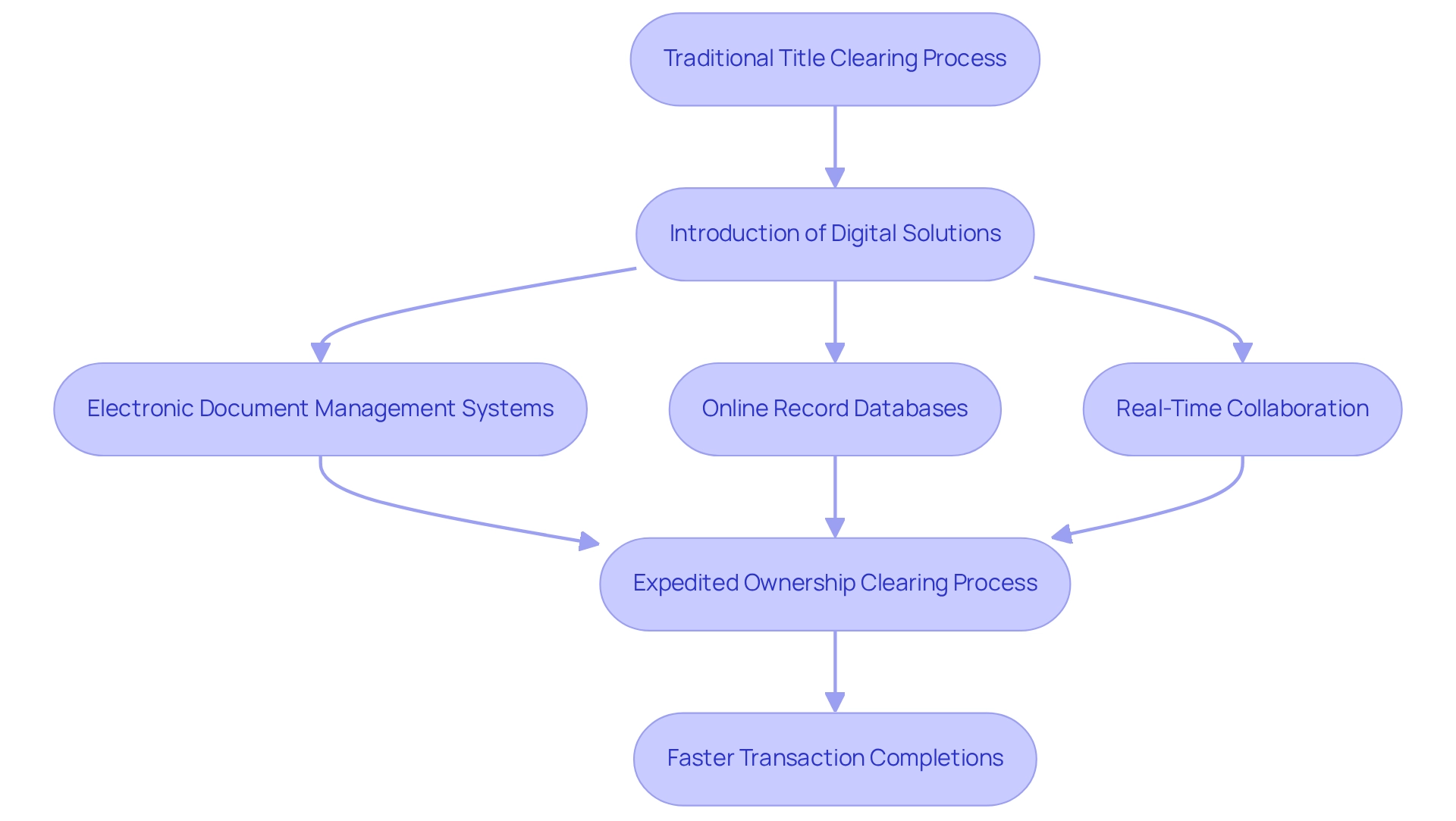
Legal Language Interpretation: Navigate Complex Title Documents
Navigating the intricate legal language in ownership documents presents significant challenges due to the complexity and specificity of the terminology employed. must possess a strong aptitude for interpreting these documents to effectively identify potential issues that could impact real estate transactions. Training in is essential, as it ensures that all parties involved comprehend their rights and obligations, thereby reducing the likelihood of disputes stemming from misinterpretations.
Furthermore, statistics show that there are 40 entries classified under , highlighting the extent of language that researchers must master and the potential dangers related to misinterpretation. As Hjort-Pedersen and Faber note, adding or subtracting information in is a high-risk procedure, as it can alter the legal meaning or effect of the translated text.
Effective training initiatives have shown that improving not only boosts the precision of research but also cultivates greater assurance among experts in their capacity to handle intricate documents. Expert insights reveal that a solid foundation in [legal terminology](https://jurtrans.com/category/legal-translation-quotes) is essential for researchers, as it enables them to interpret documents with precision and clarity, ultimately resulting in more efficient and effective in commercial real estate.
Moreover, the vagueness of legal terminology, as addressed by Lucja Biel, emphasizes the persistent difficulties researchers encounter in maintaining fidelity to the source text.
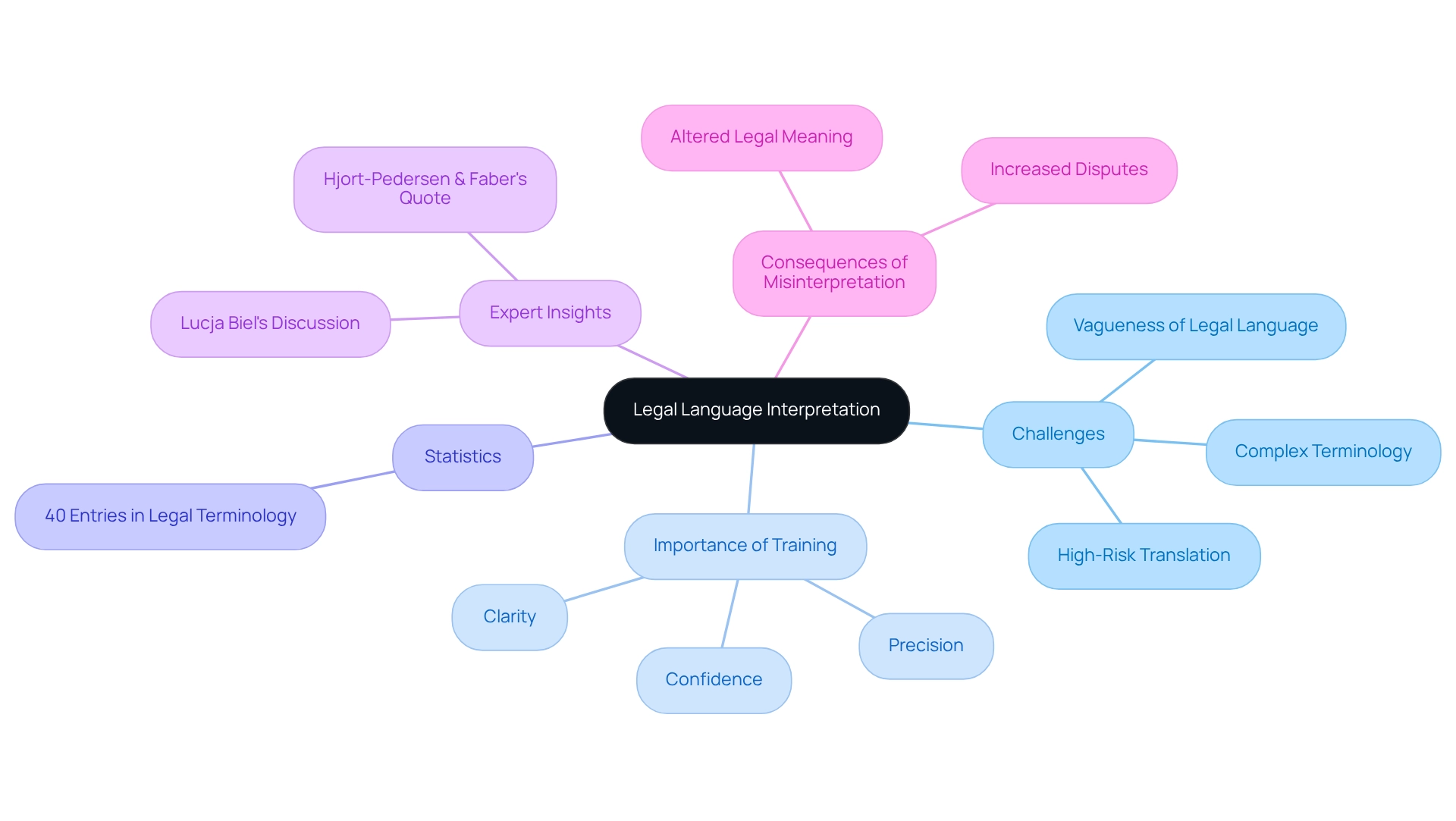
Accurate Title Records: Ensure Compliance and Informed Decisions
Maintaining is crucial for complying with and facilitating during transactions. Inaccurate records can lead to disputes, , and legal complications, emphasizing the necessity for diligence in title curative actions in commercial real estate.
Recent statistics reveal that inaccuracies in can cause , emphasizing the need for title curative actions in commercial real estate, as estimates indicate that up to 30% of ownership searches encounter issues due to record discrepancies.
Furthermore, of ownership records are essential practices that facilitate title curative actions in commercial real estate, ensuring all information remains current and accurate. This proactive approach not only safeguards the interests of buyers, sellers, and lenders but also enhances the overall integrity of the real estate market through title curative actions in commercial real estate.
As Madhavan M K, a company secretary, aptly stated, "In the boardroom, one person speaks the law. That person is the Company Secretary." This underscores the vital role in maintaining precise record information.
Case studies have shown that implementing systematic checks can significantly improve record accuracy, thereby reducing the risk of compliance issues. By prioritizing accuracy and conducting regular audits, real estate professionals can ensure adherence to regulations and foster trust among stakeholders through title curative actions in commercial real estate.
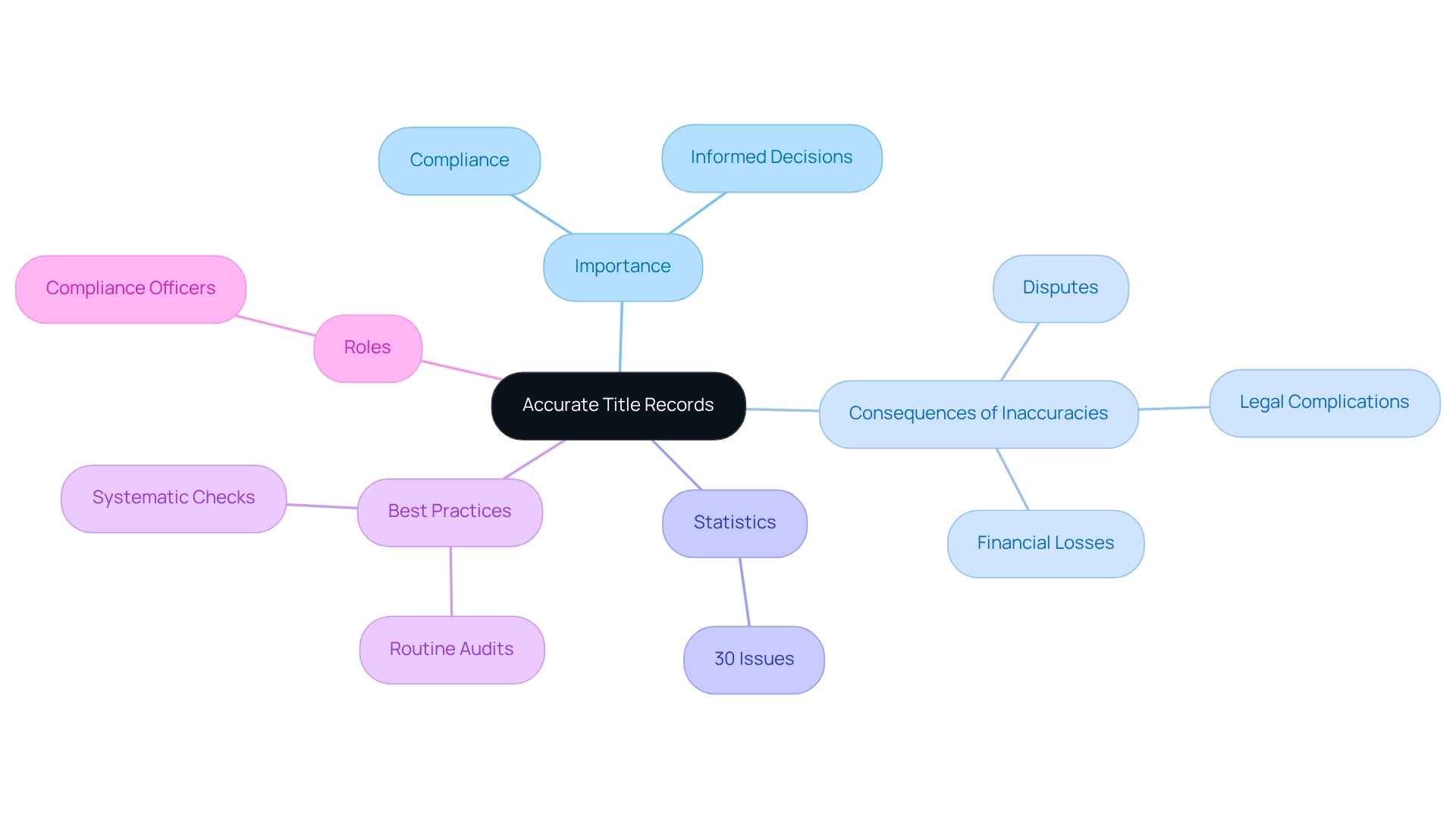
Collaboration with Land Service Professionals: Tackle Title Challenges Together
Cooperation with land specialists is essential for effectively addressing ownership challenges. By integrating their expertise, can exchange valuable insights and resources, leading to comprehensive solutions. This collaboration significantly enhances the ; studies indicate that such efforts can by as much as 30%.
Furthermore, of the complexities associated with property ownership and verification, ultimately benefiting all parties involved. Successful partnerships in this field not only streamline workflows but also contribute to , with estimates suggesting reductions of up to 25% compared to traditional methods.
A case study on the intricacies of collaborative sourcing illustrates how among stakeholders can minimize inefficiencies, ensuring that related challenges are addressed with precision and speed.
As industry expert Pat Pickle observes, 'Embracing collaboration in property investigation is not merely advantageous; it is a strategic requirement for .
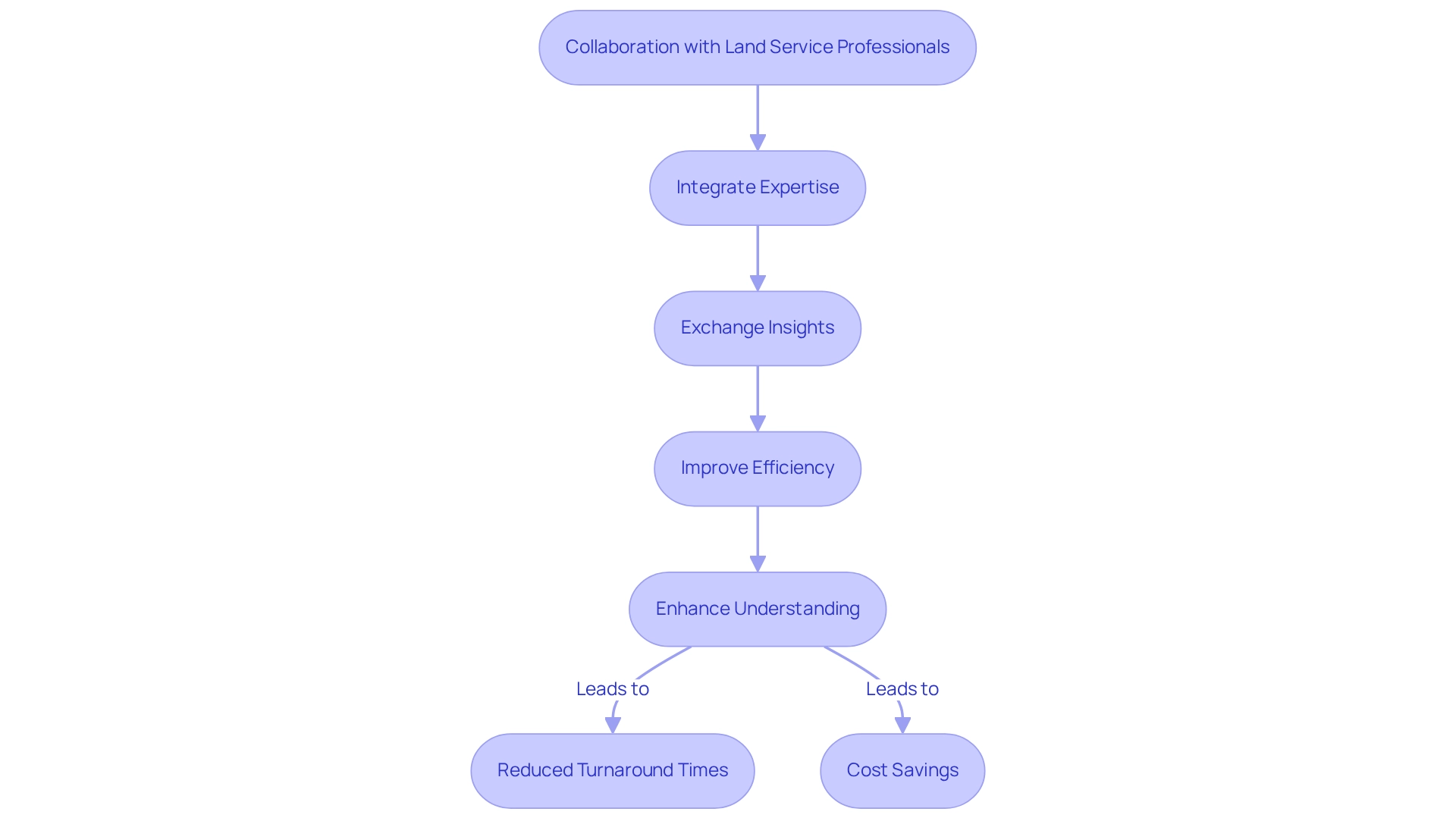
Outsource Title Curative Services: Enhance Efficiency and Reduce Costs
can significantly enhance efficiency and reduce operational expenses for firms dealing with titles. By collaborating with , organizations can leverage and research automation, effectively managing complex issues without the burden of maintaining a large internal team. Parse AI's platform, featuring an example manager, facilitates from unstructured documents, enabling researchers to complete abstracts and reports faster and more accurately.
In today's dynamic real estate environment, the need for flexibility and agility in workflows is paramount. By working alongside external specialists, property firms can adapt more swiftly to changing demands and challenges, ensuring they remain competitive. Furthermore, Analyze AI's automated document processing features, including full-text search and machine learning extraction, simplify runsheet creation, further improving .
Expert insights from company executives underscore the importance of outsourcing as a method to simplify processes and enhance delivery. They note that utilizing external resources not only mitigates risks related to ownership issues but also accelerates turnaround times, ultimately benefiting clients. Organizations employing Parse AI's solutions have reported decreases in operational costs, enabling them to allocate resources more efficiently. In summary, the implementation of in , particularly with the assistance of advanced technologies like those provided by Parse AI, represents a strategic decision that can yield increased efficiency, substantial cost savings, and improved service quality. This makes it an appealing choice for companies aiming to thrive in a dynamic sector.
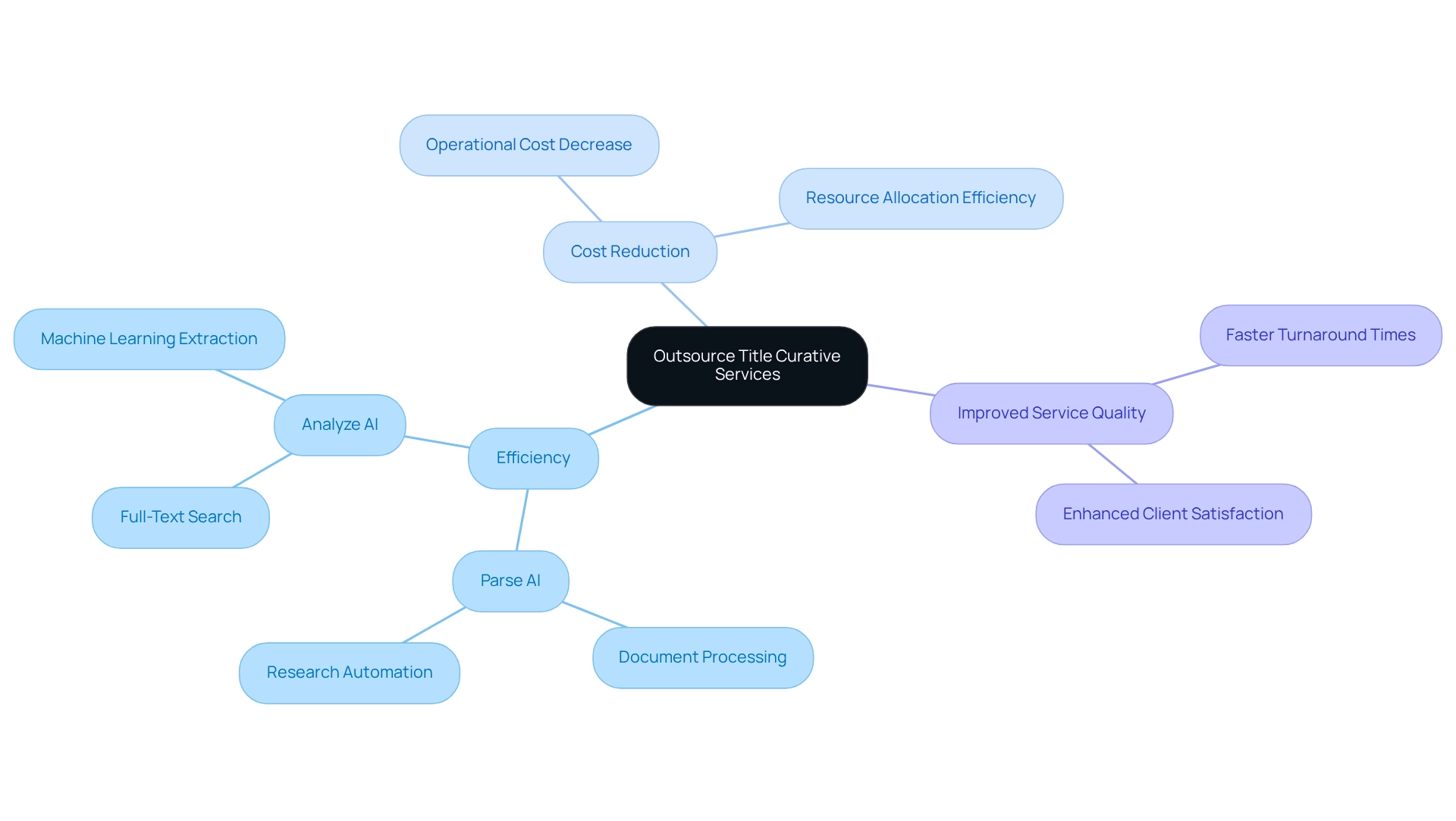
Continuous Improvement: Optimize Title Research Processes
Ongoing enhancement in ownership investigation procedures is essential for navigating the evolving real estate landscape, particularly regarding . By consistently assessing workflows and pinpointing areas for improvement, firms can adopt . As industry leader Synergy Enterprises emphasizes, "Establishing inclusive environments and practices is crucial for effective analysis, ensuring that all stakeholders are acknowledged in the process." This proactive strategy not only elevates service delivery but also empowers organizations to better meet the changing needs of their clients.
Incorporating statistics further illustrates the impact of continuous improvement. For instance, studies indicate that organizations implementing regular workflow assessments can reduce turnaround times by up to 30%, resulting in substantial cost savings. A pertinent case study is at the National Center for Education Statistics, where of data compilation and reporting.
Conducting regular of ongoing enhancement, enabling teams to optimize operations and elevate the quality of their outputs. To refine research processes for titles, directors should consider actionable steps such as:
- Conducting
- Soliciting feedback from team members
- Integrating and analysis
By doing so, organizations can not only improve their service delivery but also ensure they remain competitive in the dynamic real estate market.
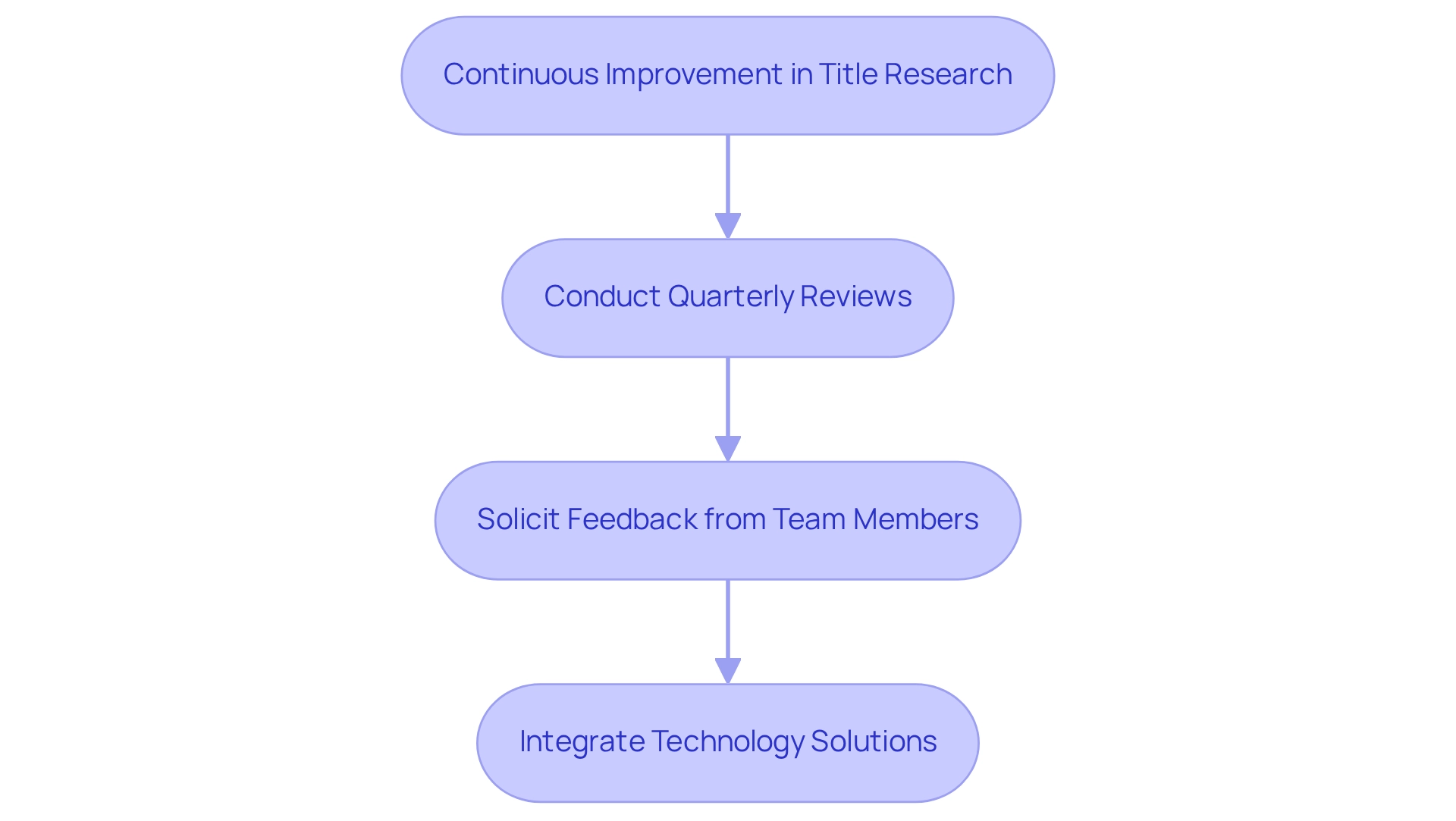
Proactive Management: Use Technology to Prevent Curative Needs
to identify and address potential ownership issues before they necessitate corrective actions. By utilizing advanced analytics and , property firms can promptly detect discrepancies and implement necessary remedies. Statistics reveal that enhance visibility and , providing actionable data crucial for document analysis. This strategic approach not only conserves time and resources but also significantly bolsters the .
Furthermore, organizations that employ can more effectively manage cash flow and pinpoint growth opportunities, demonstrating the broader advantages of anticipating challenges. As Elise London, a member of the Forbes Councils, asserts, "It's time to stop thinking of IT as a back-office or behind-the-scenes department," underscoring the vital role of technology in proactive management. The integration of analytics in document examination empowers experts to make informed decisions, ensuring that potential issues are addressed swiftly and efficiently.
Training and Education: Equip Teams for Complex Title Issues
Investing in is essential for effectively addressing complex ownership issues. Frequent workshops and seminars significantly enhance team members' understanding of legal terminology, technology applications, and . Organizations that implement structured training programs, for instance, report a 30% increase in efficiency and accuracy in research tasks, as evidenced by case studies demonstrating the impact of targeted training initiatives.
By fostering a culture of continuous education, organizations not only empower their teams but also prepare them to navigate the evolving challenges of the industry. Furthermore, ongoing education is linked to , enabling researchers to tackle intricate issues with greater confidence. Successful workshops have shown that interactive learning techniques, such as digital quizzes and real-time feedback mechanisms, can enhance comprehension and retention of vital concepts.
However, it is crucial to be wary of , which may impede the development of foundational skills. As Richard Branson wisely remarked, 'Train people well enough so they can leave. Treat them well enough so they don't want to.'
As the industry progresses, the will be pivotal in ensuring that remain proficient and responsive to the demands of their roles in title .
Conclusion
The integration of technology in title research and curative services is fundamentally reshaping the real estate landscape, driving efficiency and accuracy in property transactions. Advanced machine learning tools, such as Parse AI, are revolutionizing how title researchers extract vital information and manage complex documents, significantly reducing time and the potential for human error. Coupled with the importance of title curative services, which address ownership discrepancies, a proactive approach to managing title issues is crucial in safeguarding the interests of all parties involved.
Furthermore, the emphasis on digital solutions and legal language interpretation underscores the necessity for real estate professionals to adapt to a rapidly changing environment. By leveraging digital tools and enhancing their understanding of legal terminology, title researchers can navigate intricate documents with greater confidence, ensuring compliance and informed decision-making. Collaboration with land service professionals and outsourcing title curative services further enhances operational efficiency, allowing for quicker resolutions and substantial cost savings.
Ultimately, continuous improvement and proactive management strategies are essential in optimizing title research processes. Investing in training and education equips teams to tackle complex title issues, fostering a culture of excellence that is vital in today’s competitive real estate market. As the industry evolves, embracing these innovations and best practices will not only streamline operations but also pave the way for smoother and more secure property transactions, ensuring a brighter future for all stakeholders involved.
Frequently Asked Questions
What technology does Parse AI use to enhance document examination?
Parse AI employs advanced machine learning algorithms to improve the extraction of essential information from document titles, significantly reducing the time required for document examination.
How does Parse AI benefit investigators in their work?
By automating repetitive processes, Parse AI allows investigators to focus their efforts on more complex assignments, improving accuracy and reducing the potential for human error.
Why is efficiency important in the property sector according to Kurt Uhlir?
Kurt Uhlir emphasizes that presenting oneself as a local expert and expanding property business is a top priority, highlighting the importance of efficiency in the property sector.
What role do curative offerings play in property transactions?
Curative offerings are essential for rectifying flaws in documents that may obstruct property transactions, conducting thorough investigations to identify discrepancies in ownership records and implementing corrective measures.
How can boundary surveys aid in property transactions?
Boundary surveys accurately delineate property lines, significantly reducing the likelihood of disputes and facilitating timely closings.
What is the significance of effective curative measures in resolving ownership discrepancies?
Effective curative measures can expedite the resolution of ownership discrepancies, which is crucial in commercial real estate where such issues can lead to substantial financial repercussions.
How do technology and data analysis enhance curative solutions?
Current trends indicate a growing reliance on technology and data analysis to improve the efficiency of curative offerings, enabling faster detection and resolution of ownership problems.
What protection do effective title remediation offerings provide?
Effective title remediation protects buyers and lenders against unforeseen claims that they did not anticipate during property transactions.
How are digital solutions transforming the clearing process in real estate?
Digital solutions, such as electronic document management systems and online record databases, facilitate rapid access to essential documents and real-time collaboration among stakeholders, expediting the overall ownership clearing process.
What potential cost savings have been identified with the shift to digital solutions?
The shift to digital solutions has unveiled potential government-wide cost savings ranging from $1.4 to $3.0 billion, highlighting the efficiency gains achievable through automation.
What trends are expected in 2025 regarding automated solutions in real estate?
Current trends indicate a pronounced shift towards automated solutions, enhancing operations and improving precision in research, as illustrated by case studies showing marked reductions in processing times.




